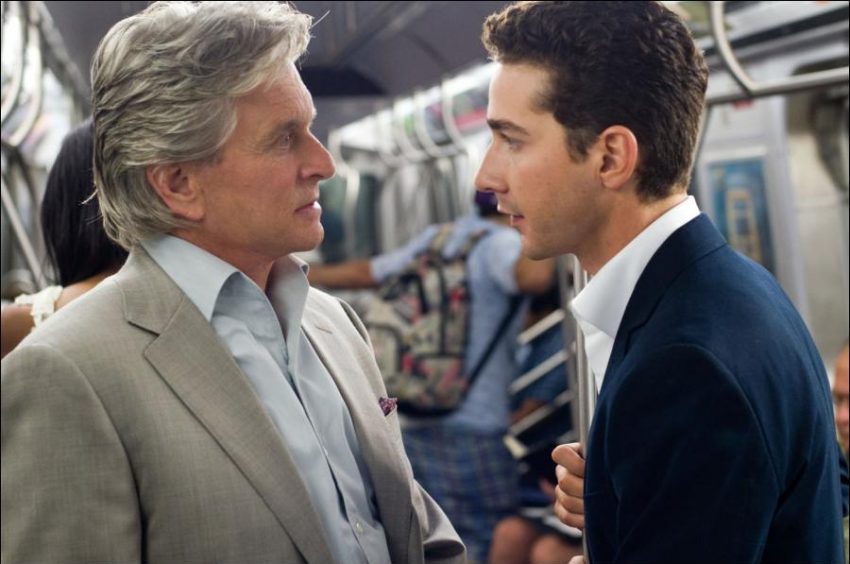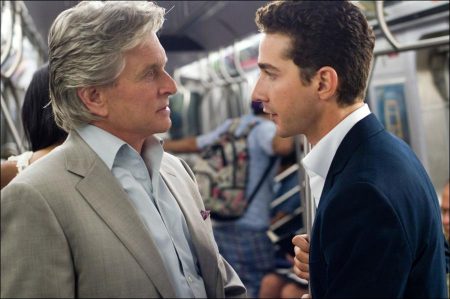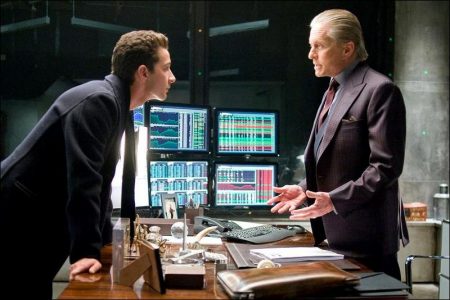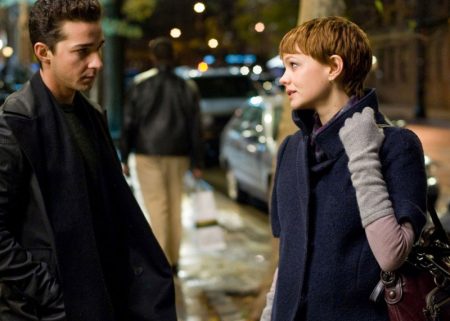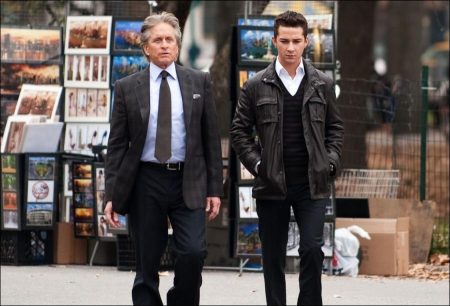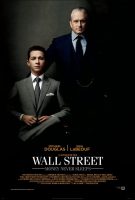Taglines: Gordon never gives up.
In 2001, Gordon Gekko (Michael Douglas), having served his time for securities fraud, money laundering and racketeering, steps outside the gates of a Federal Correctional Facility a changed man. No longer the king of Wall Street, Gekko is unshaven, his hair unkempt. No one is there to meet him, not even his daughter Winnie, from whom he is estranged, nor any of his Wall Street colleagues, who have kept busy during his absence amassing ever-larger fortunes. After eight years inside, Gekko is now alone, and an outsider.
In 2008 Jake Moore (Shia LaBeouf), a smart young proprietary trader, is making millions at the venerable Keller Zabel Investments, run by Louis Zabel (Frank Langella), Jake’s mentor. Jake’s girlfriend, Winnie (Carey Mulligan), meanwhile, is supportive of his drive – fueled by an idealism she finds lacking in her father Gordon – to invest in green energy.
A wave of rumors that Keller Zabel is stuck with billions in toxic debt causes the company’s stock price to suddenly nose-dive, and Louis Zabel is forced to fight for his company’s life at a meeting of the Federal Reserve. When the government refuses a bail-out, Bretton James (Josh Brolin), a partner at the powerful investment bank, Churchill Schwartz, arranges a takeover of Keller Zabel for a fraction of its worth.
Now deeply in debt himself, his employment at risk, and suffering the loss of his mentor, Jake attends a lecture at Fordham University given by Gordon Gekko, who is promoting his new book, Is Greed Good? Gekko’s speech describes how greed is no longer just good – it’s legal – and how a malignancy in the financial system, with its rampant speculation and leveraged debt, will doom the U.S. economy.
Unbeknownst to Winnie, Jake seeks out Gekko and offers to help facilitate a rapprochement with his daughter, while Gekko offers Jake information as to why Louis Zabel was betrayed by his fellow bankers. An alliance is thus formed in order for Jake to avenge Keller Zabel’s fall, and to help Gekko rebuild a relationship with Winnie. But has Gekko truly shed his reptilian skin?
The film’s director, three-time Academy Award winner Oliver Stone, is one of today’s most honored and successful filmmakers. For Stone, returning to the world he captured so memorably in 1987’s “Wall Street” was not only timely but an opportunity to explore something new. “I think this film is a hell of an entertaining tale and it’s fun,” he says. “I don’t think I would have enjoyed working on WALL STREET: MONEY NEVER SLEEPS if it hadn’t been a wholly original story. Twenty-two years later makes a huge difference. It was very fresh to me.”
Michael Douglas is back in his Oscar-winning role as Gordon Gekko whose iconic “Greed is good” mantra and daring corporate raids made him a rock star of financial titans. Douglas’ distinguished work as a motion picture actor and producer was recently recognized by the American Film Institute with its Life Achievement Award.
One of today’s most popular young stars, Shia LaBeouf toplined the summer blockbuster “Transformers: Revenge of the Fallen.” Josh Brolin, a recent Academy Award nominee for his work in “Milk,” portrays Bretton James, a ruthless Wall Street kingpin looking to mentor LaBeouf’s Jake Moore character. Frank Langella, an Oscar nominee for his performance as Richard Nixon in “Frost/Nixon,” is Louis Zabel, Jake’s boss, whose ill fortune propels Jake on a journey of discovery; Carey Mulligan, who won acclaim and an Oscar nomination for her starring role in the independent drama “An Education,” portrays Winnie Gekko, Gordon’s estranged daughter and Jake’s fiancée; and Susan Sarandon, Oscar winner for “Dead Man Walking” and a four-time nominee, is Jake’s mother Sylvia, who seeks help from Jake when her real estate business is derailed.
The Edward R. Pressman Production is written by Allan Loeb and Stephen Schiff, based on characters created by Stanley Weiser & Oliver Stone. Edward R. Pressman and Eric Kopeloff are the producers. Pressman’s credits include the first “Wall Street”, “Badlands,” American Psycho,” “Conan the Barbarian,” “Bad LT.,” “Thank You For Smoking,” “The Crow” and “Reversal of Fortune.” Kopeloff collaborated with Stone on “W,” and was an executive producer on “Stranger than Fiction.” Celia Costas, Alex Young and Alessandro Camon are the executive producers.
After the success of Stone’s Academy Award-winning film, “Platoon,” a searing story about the Vietnam War, Oliver Stone chose as his next project a story about the battlefield of American business. Released in 1987, “Wall Street” was the story of Bud Fox, a young stockbroker played by Charlie Sheen, who, in his drive to succeed in the world of finance, becomes corrupted by a powerful and brilliant corporate raider, Gordon Gekko, played by Michael Douglas.
“In making ‘Wall Street,’ I really wanted to see the war at home, so to speak, the war in the financial jungle of New York, which is my hometown,” Stone says. In fact, Stone’s father was a stockbroker in New York, so the filmmaker was already well acquainted with the Street when he directed the film.
Given Michael Douglas’ iconic link to the character that Stone created with Stanley Weiser, his co-screenwriter on “Wall Street,” it may come as a surprise that Douglas’ casting as Gekko was unexpected. Stone explains: “Michael had never done a Gekko-type role at that time. He had played mostly romantic or comedic leads, and in ‘Wall Street’ he was interpreting a character that was frankly, downright nasty.”
In ‘Wall Street’ Gekko gives a speech at a stockholders’ meeting in which he extols greed as a positive force in American capitalism. “Greed – for lack of a better word – is good,” proclaimed Gekko. “Greed is right. Greed works. Greed clarifies, cuts through, and captures the essence of the evolutionary spirit. Greed, in all of its forms–greed for life, for money, for love, knowledge–has marked the upward surge of mankind.”
The speech is one of the memorable in film history and to this day, “Greed…is good” remains an oft-quoted line in the media’s incessant coverage of the current financial crisis. Douglas’s performance as Gordon Gekko earned him the Academy Award for Best Actor, while the character of Gekko has endured and become part of American culture and one of the cinema’s great villains. Over two decades later – and after reprising Gekko for WALL STREET: MONEY NEVER SLEEPS – Douglas marvels at the character’s continuing impact. “Of all the parts I’ve played, Gekko is the one people approach me about the most,” he says. “They get a kick out of Gekko – which was always a surprise to me because he was a true villain!”
But then, reasons Douglas, “Wall Street is theater. People love stories about power; people are seduced by power. So I think that’s a reason Gekko and the film ‘Wall Street’ have endured all these years.”
“Gordon Gekko, through innumerable references in newspapers and magazine articles, has become an iconic character,” says producer Edward Pressman, who produced “Wall Street,” one of several films he would make with Oliver Stone. “‘Wall Street’ created the idea of the culture of that financial capital, so it actually affected the people who work there to behave and dress in a certain way.”
Indeed, Gekko’s charisma and take-no-prisoners approach to deal-making and wealth accumulation unexpectedly made him a hero to many. Not only did young men on Wall Street adopt Gekko’s trademark slicked-back hair and suspenders, but they took his famous “Greed is good” mantra to heart.
“The film’s popularity grew over the years,” adds Stone, who was initially surprised by the way audiences embraced Gekko. “I made ‘Wall Street’ as a morality tale, and I think it was misunderstood by many. It’s still amazing the number of people who came up to me over the years and said, ‘I took on a career on Wall Street because of your movie.’ Many of them are now in their 30s, 40s and were doing quite well on the Street — as honest traders, I should add.”
But even Stone couldn’t envision the events that would make the Gordon Gekkos of the world look like small-timers – and ultimately lead to the worst financial crisis since the Great Depression. After completing “Wall Street,” Stone went on to direct many more seminal films, such as “Born on the Fourth of July,” “Natural Born Killers,” “JFK,” and most recently, “W,” while the masters of finance became richer and richer. “What shocked me was this exponentially-growing accumulation of wealth kept going, into the 1990s and 2000s,” says Stone. “The numbers grew and grew, so the millions of dollars became billions of dollars. And the greed of Gordon Gekko was swamped by the greed of the banks.
“By 2008, no more Gordon Gekkos were possible,” he continues. “That character, that kind of buccaneer, was now gone, replaced by institutions that had once formerly been regulated. In the past, a bank was a bank, and an insurance company was an insurance company. In 2008, that all changed. The firewalls between these functions were destroyed by the deregulation of the 1980s and 90s.”
As these real-life Wall Street developments unfolded, work began on a story and screenplay that would catch up with Gekko years after the events of “Wall Street.” Stone was not involved in the film’s development at that point, and it wasn’t until early 2009, when he read screenwriter Allan Loeb’s script for WALL STREET: MONEY NEVER SLEEPS that he considered tackling a new film about the characters and world he had brought to life with “Wall Street.”
“Allan Loeb had experience in finance, and he took an approach which encapsulated the last year of Wall Street and the world economy,” says producer Ed Pressman. “It was on the basis of that script that Oliver returned to the project because when he read Allan’s draft he saw how relevant and exciting the film could be.”
“The crash happened in 2008 and that made it suddenly very interesting, because you saw all the flaws in the system,” explains Stone. “WALL STREET: MONEY NEVER SLEEPS is really a reckoning with what happened.”
Adds Michael Douglas: “This is an even more interesting time to explore this world, than the period of the original ‘Wall Street.’ And Eric Kopeloff, who produced Stone’s “W” and came aboard to produce WALL STREET: MONEY NEVER SLEEPS with Ed Pressman once Stone committed to the project, points out that, “If there was any time to reprise this, a story of Wall Street, now would be the time.”
Allan Loeb, a licensed broker/dealer, and self-proclaimed “finance junkie,” had been hired by Pressman to write on WALL STREET: MONEY NEVER SLEEPS in late 2008 (after award-winning critic and screenwriter Stephen Schiff had contributed several drafts), and thus did most of his research during the height of that year’s economic meltdown. “I was meeting with big, big names of finance at the height of the crash,” Loeb remembers. “A lot of these Wall Street guys were going through spiritual moments, so it was interesting to talk to them then.”
For his research, Loeb met with executives at hedge funds and major banks, and spent a lot of time with a former trader at one of the nation’s largest firms. But what unnerved Loeb most was the prospect of pitching the story to “Gordon Gekko” himself – Michael Douglas. Douglas had expressed interest in reprising his award-wining role as Gekko, but only with the right story.
“I had this moment when I felt like [young “Wall Street” protagonist] Bud Fox because I was going to meet the great Gordon Gekko, if you will, and pitch him his own story,” Loeb recalls. “It was a bit nerve-wracking to go pitch Michael Douglas, whom I’d never met and who’s larger than life and is a wonderful actor.”
Loeb’s and Schiff’s script for WALL STREET: MONEY NEVER SLEEPS not only illustrates what happened to the American economy in late 2008, but also tells a compelling dramatic story, in which Gekko is a changed man after years in prison and an even longer stint as an outsider on Wall Street. Impressed with the script, Douglas signed on.
The story begins when Gekko emerges from Federal prison in 2001, after serving eight years. While away, his wife has divorced him, his son has died, and his one remaining family member, his daughter Winnie, won’t speak to him. She blames Gekko for the disintegration of their family. “As high-powered as Gekko was in the first picture, that’s how low he starts in this one,” says Michael Douglas.
“Gekko is humbled,” says Loeb. “He lost his family, and just as important for Gordon, he went into prison as a player. He was a major player in a big game, and he was the guy. He may have gone into prison with, say, 50 million dollars, and he got out of prison in the early 2000’s with nothing in a world that’s changed. Gordon was out of the game and he was irrelevant. And that to him was the most humbling thing.”
Gekko’s imprisonment taught him many lessons, says Douglas. “He’s had a lot of time to think. He can see much more clearly. He’s bearish on what’s been transpiring in the world of finance. Gekko is able to look at the problems objectively and he can see how screwed we are.”
When Gekko is released from prison, he is determined to reestablish his position as a Wall Street power broker. But he’s looking for more than re-accumulating vast sums of money; “Gekko wants to be acknowledged,” Douglas explains. “It’s one of the reasons he’s written a book.”
Gekko is equally resolute to win back the love of his daughter Winnie – to put together the family that he himself was responsible for tearing apart. The dichotomy of Gekko’s ambitions versus his commitment to reconnecting with his daughter provides some of the film’s most dramatic and emotional moments.
To attain both of these goals, Gekko joins forces with Jake Moore, who is engaged to Winnie. Jake personifies the brilliant technologically savvy individuals who by 2008 were making millions before they turned thirty. Gekko uses Jake to gain access to Winnie – and Jake seeks Gekko’s advice in gaining the upper hand over Bretton James, a ruthless investment banker whom Jake holds responsible for his mentor and firm’s destruction.
To play the role of Jake, Oliver Stone cast Shia LaBeouf, star of the hugely successful “Transformers” films, as well as the recent “Indiana Jones and the Kingdom of the Crystal Skull,” and the thriller “Disturbia.” “He reminds me of a young Tom Cruise [with whom Stone worked on “Born on the Fourth of July”],” says Stone of LaBeouf — “The same drive, work ethic, and energy.”
LaBeouf was drawn to the role of Jake for several reasons, including his admiration for Stone’s body of work. “I love ‘Wall Street’ – I’m here because of it,” says the actor. “As a movie fan, you learn a lot watching Oliver’s movies. You get a lot of facts as well as entertainment.”
In addition, starring in an Oliver Stone film was a change of pace for the young actor. “I’ve been making fantasy films for a while,” he explains. “I wanted something with teeth, and Oliver Stone makes movies with teeth.”
LaBeouf describes Jake as someone who comes from a modest background, and whose tenure as a caddie for Louis Zabel, the head of the esteemed investment bank Keller Zabel, would lead to much bigger things. “Jake is a guy who came from nothing, in Long Island, with a father who’s non-existent,” the actor explains. “Jake was hired right out of business school and put into Keller Zabel as a proprietary trader, and starts trading his own account. He works his way up the ladder and becomes Zabel’s right-hand man at a young age.”
“When I took the movie I knew little of the world of finance – I didn’t know what a derivative was, I didn’t know stocks, bonds,” he continues. “Oliver said, ‘If you want to do this you’d better get cracking [and do your homework],’ and I walked into a brokerage house office and asked them to set me up an account.”
LaBeouf then dove into his research with zeal. After what amounted to an intensive course in finance at various investment and trading houses, LaBeouf made a modest investment grow exponentially. He also passed his Series 7 test, becoming a licensed broker-dealer.
“hia had this unbelievable drive, wanting to learn as much as he could about this world,” say producer Eric Kopeloff. “And that really impressed Oliver.”
In fact, Stone himself is known for his intensive research. “The thing about the first film was that it rang true to the most sophisticated Wall Street types,” says producer Ed Pressman. “I think Oliver’s concern is that he’s able to reach that level of authenticity so that the film can play in New York but also play in Peoria.”
“The thing I learned about Oliver immediately is that he is militant for credibility,” adds screenwriter Allan Loeb. “His insistence on authenticity was very helpful and took the script and the project to the next level. When you see the movie, you say, this is Wall Street, but it’s now.”
As part of this research, Stone and his team visited investment banks, hedge funds, and met with some of the biggest names in finance. “We talked to everybody we could, including some of today’s most prominent financial wizards and politicians,” says the director.
“We were able to pick up The New York Times and The Wall Street Journal and compiled a list of interesting people to meet,” Kopeloff recalls. “And it was incredible because most of those people were more than happy to sit down and talk with us, whether it was on the record or off the record, about the state of Wall Street today. Their openness had everything to do with their love of the original “Wall Street” and their love of the character of Gordon Gekko.”
In the new film’s look at Wall Street, investment bankers who, working on a global scale, make hundreds, rather than tens, of millions of dollars, supplant the ekko-esque corporate raiders of the 1980s. The character of Bretton James, a partner at the powerful investment bank Churchill Schwartz, personifies that type of runaway wealth. Stone cast Josh Brolin, who had starred in the director’s recent film “W,” as James. “Bretton, as played by Josh, is the chief antagonist in the sense that he is the new generation, forty years old, rising banker at the top of the pole,” describes Stone. “He’s very rich, very arrogant, one of four or five partners in a major investment bank.”
Brolin, who once worked as day trader, embraced the opportunity to again collaborate with his “W” director, Oliver Stone. “We work very well together,” says the actor. “And I had a trading business for a few years, and I feel like I’ve done the research. I’m fascinated with the world of finance.”
James’ confidence and talent lead to success for himself and his company, including a takeover of Keller Zabel. “James very smartly takes advantage of a very weak situation with another investment bank, and acquires it,” explains Brolin.
James had once locked horns with ekko. Jake is eager to tap the latter’s insights into the formidable investment banker’s potential weaknesses, and thus avenge the destruction of Jake’s employer and mentor, whose firm was also ruined by James’ machinations. But Gekko’s information comes at a price: he wants Jake to bring him back together with his estranged daughter Winnie – who is Jake’s fiancée. “Jake works with Gekko against Winnie’s wishes,” says Shia LaBeouf. “Jake knows Gekko has a great mind, asks for Gekko’s help in some high-stakes maneuvers. And Jake helps Gekko rekindle a relationship with Winnie.”
To play Winnie, Stone cast a fresh face, Carey Mulligan, whose acclaimed performance in “An Education” made a huge impression on the director. “I called Carey and said, ‘I’d really love you to read this. I think you’d be great for the part of Winnie,’” Stone recalls. “And she was shocked that she never had to audition for the role.”
“She’s not had an easy road, really,” says the young actress about her character. “Her father was notorious, and everyone knew what had happened to him and what he’d done. So her whole upbringing was just clouded by courts and her family splitting apart.”
In response, Winnie has cut off all contact with her father and become a journalist for a politically progressive website. “She’s gone completely the other way from Gekko and gone into a more altruistic way of living, and has proper values that he doesn’t have,” Mulligan explains. “But she still has the fight that a Gekko has, as much as she doesn’t want to have any interest in that world.”
Mulligan admires the film’s degree of accuracy not only in depicting recent events on Wall Street, but also how the story presents the personal lives of the characters. “It balances out, so that when you go through the section of a big boardroom meeting, then you see what happens when they get home,” she says. “It’s wonderful that when we do the sort of human, emotional side; it’s just as truthful.”
Another woman in Jake’s life – his mother Sylvia Moore – has become caught up in the rush to make quick money. “In the tradition of the 90s, she’s become a realtor,” says Stone. “Sylvia ends up going in way over her head and depending on her son to get her out.” At first Sylvia tries to sell a house to Jake and Winnie, and is later forced to borrow money from Jake when her properties begin to lose their value.
Stone cast Academy Award-winning actress Susan Sarandon to play Sylvia. “I always wanted to work with Susan,” he says. “I had admired her from a distance, and I never really knew her. And she was up for it and had the right spirit of fun.”
Jake’s father figure is also his mentor in the business: Louis Zabel, the respected head of Keller Zabel Investments. “I think Jake looks up to what Lou stands for,” says Frank Langella, who takes on the role. “Jake was a boy who needed a mentor and Louis came along at just the right time in his life. And it’s a very sweet, but very gently stated relationship. I think you have the sense that they care about each other.”
Langella describes the script as “extraordinarily well-written, and very intelligent about what is happening in the world.” In fact, he feels the new film will hit home for more people than “Wall Street” did in the 1980s. “We are more sophisticated now than we’ve ever been about Wall Street players and bankers and insurance companies. So I think the movie will have even more resonance now in 2010 than ‘Wall Street’ did twenty years ago.”
Another veteran of the world of high finance is Julie Steinhardt, a senior partner at Churchill Schwartz, to who even the powerful Bretton James must report. Eli Wallach, an actor whose career has spanned seven decades, portrays Julie. “I turned to Eli because I thought he’d be one of the tough old guard – and not necessarily on the up and up, either,” says Stone. “With Eli, you sense there’s a crime behind Julie’s story, too.”
Eli Wallach sees his character as someone who, having remembered the crash of 1929, can offer sage advice to his fellow bankers. “I talk about what it was like in the past,” says Wallach. “Hoping that I’ll guide them into some proper way in the future. And sometimes it doesn’t work.” “What I think is marvelous about this movie is that we’re talking about Wall Street now,” he adds. “And it is a frightening thing that’s happening with money and banks.”
Wall Street: Money Never Sleeps (2010)
Directed by: Oliver Stone
Starring: Carey Mulligan, Shia LaBeouf, Charlie Sheen, Josh Brolin, Michael Douglas, Annika Pergament, Maria Bartiromo, Nitya Vidyasagar, Annika Pergament, Sean Stone, Edward Henzel
Screenplay by: Allan Loeb, Stanley Weiser, Oliver Stone
Production Design by: Kristi Zea
Cinematography by: Rodrigo Prieto
Film Editing by: David Brenner, Julie Monroe
Costume Design by: Ellen Mirojnick
Set Decoration by: Diane Lederman
Art Direction by: Paul D. Kelly
Music by: Craig Armstrong
MPAA Rating: R for Brief strong language and thematic elements.
Distributed by: 20th Century Fox
Release: September 24, 2010
